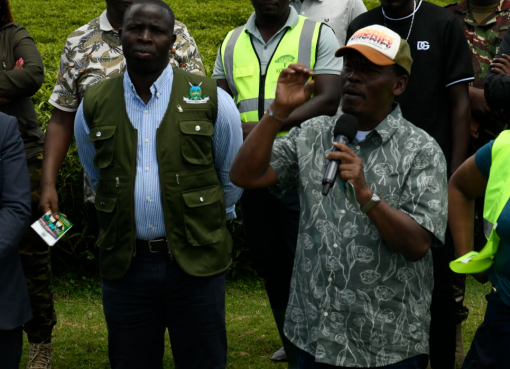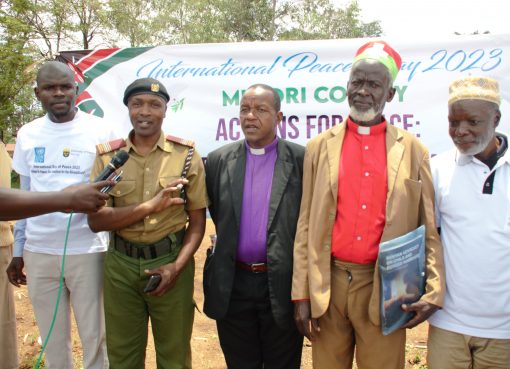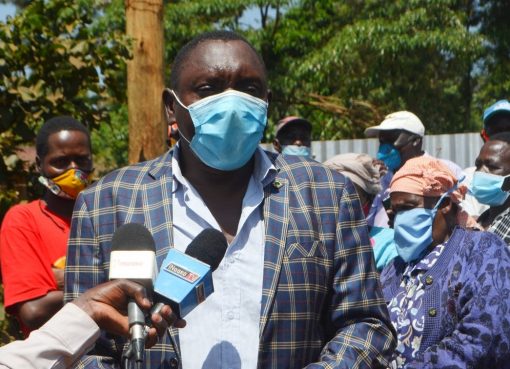A government crackdown on illegal gold mining and processing plants in Migori County appears to have hit hard on some powerful individuals linked to the business who are now turning back to the same authority for protection.
It became apparent last week that the same powerful gold business people had made a passionate appeal to the government to go slow on them by reigning on the no-nonsense team of county multi-agency officials – that has so far shut over 40 illegal firms – to cool down on them.
An impromptu courtesy call on the Chairman of the multi-agency team, Joseph Rotich, by Mining and Petroleum Cabinet Secretary (CS), John Munyes, Thursday last week, has left no doubts that the one-week raid against the contraveners of the mining Act, 2016 has taken a toll on the victims.
Munyes while speaking on the current state of mining industry in the area in the presence of other members of the team appeared to advocate for an enforcement that will see all players in the sector benefit as he vouched for adherence to the laws governing the industry.
He said as much as the laws agitate for the protection of the environment, it was also prudent that all those with licenses for mining, processing and dealing in gold be allowed to do so, subject to conformity to all other laws regulating the mining sector.
Flanking the CS during the courtesy call was area Governor, Okoth Obado whose two processing plants have so far been closed for partly flouting the mining laws.
Obado defended his two plants, saying he had already renewed their operation licenses and did not understand why the multi-agency team had to shut them.
However, the presence of the CS in the region and Obado’s face in his tour of local mines has left tongues wagging among the residents, although Munyes explained that he was in the area to see how the Jua-kali-made stone crashers fabricated in the area could be exported to other areas, especially Turkana for use by gold miners.
But as the CS expressed his dilemma in achieving total order in the industry, it also emerged that some of the owners of the closed plants in Migori had actually obtained licenses for processing gold (whether through clean or dubious means), but on the other hand had not obtained permits for public health, environmental protection or land ownership.
Some of the affected business people have also been violating labour laws, evading paying taxes and encroaching public lands in carrying out their ventures.
The bone of contention in the whole saga surrounding gold prospecting business appears to be the fact that the office of the CS had already issued out licenses allowing the big gold prospecting plants to engage in the business yet the same firms have not complied with other necessary requirements contained in the same Mining Act, 2016.
“I do not want to be dragged to court as a result of shutting plants which have operating licenses. So mining officers and all in other departments concerned with matters to control mining activities must discharge their duties diligently to ensure things are right in the industry,” he emphasized.
Munyes, however, called for a fair balancing in the enforcement of the mining laws to ensure that both the players and the environment are protected, as well as allowing the government to collect enough taxes from the sector.
“This is also a sector that is viable for job creation and poverty alleviation hence must be run in a professional way to up-lift the economy of the region and individuals’ incomes,” stressed the CS.
According to a report of a task force on mining issues within Migori County, there are about 60 leaching plants and six elution factories in the region with the numbers rising every day. Of all these operators, only two have mineral dealers processing license by April 2019.
The leaching process involves the dissolution of gold containing ores in dilute cyanide solution in the presence of lime and oxygen, while elution plants carry out the final process of gold production.
Most of the leaching plants have not put in place proper mechanism of handling and disposing cyanide waste, which is highly toxic. As a result of haphazard disposal of cyanide, several cases of animal deaths have been registered in several sites after consuming water and grass contaminated by the toxic chemicals.
The report further says that a lot of gold produced in the region remain undeclared hence millions of shillings goes uncollected by the government. Most of the gold dealers do not register their businesses under their names but use proxies to hide from paying taxes.
The task force reports recommend among a host of other recommendations that a multi-agency be used in enforcing compliancy by gold dealers.
That all processed licenses in Migori should be recorded with the regional mining and County Commissioner’s offices for smooth operations and that all labour laws must be strictly followed by all operators in the industry.
By George Agimba




